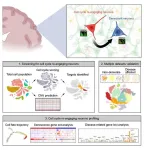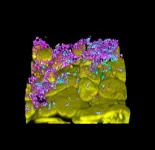(Press-News.org) A small-scale surveillance system in Tanzania for reporting livestock abortions could help protect livelihoods and provide insights on potential livestock-to-human infections.
The research, published April 16 as a Reviewed Preprint in eLife, is described by editors as an important study with convincing findings of potential interest to the fields of veterinary medicine, public health and epidemiology.
Loss of livestock through abortion is a major concern for the worldwide livestock industry, resulting in significant economic loss and posing a direct threat to public health through transmission of infection. The impact of livestock abortion on the world’s poorest livestock keepers is likely to be substantial – from the direct loss of high-quality food sources and reduced income from sales of milk or meat.
“Effective livestock health surveillance provides critical data for evidence-based approaches to disease control and management, but requires reliable, high-quality and timely data drawn from multiple sources,” says lead author Felix Lankester, Clinical Associate Professor at the Paul G. Allen School for Global Health, Washington State University, Washington, US, and the Global Animal Health Tanzania, Arusha, Tanzania. “Event-based surveillance can detect early events that signal emerging human health risks, and surveillance of livestock abortion events has clear potential for identifying and preventing outbreaks of emerging diseases. However, there is limited information on the current practices, effectiveness and challenges of livestock abortion surveillance, particularly in low and middle-income countries.”
To address this gap, researchers set up a pilot livestock surveillance system in northern Tanzania in 15 wards across five districts, with a mix of pastoral, agropastoral and smallholder livestock keepers. Livestock field officers (LFOs; government employees equivalent to para-veterinarians) received training on the safe investigation of livestock abortion and were requested to report any incidents of abortions, stillbirths and perinatal death. If the cases could be followed up within 72 hours of the abortion event, further investigation including blood, milk and vaginal swabs were collected from the aborting dam, alongside tissue and swab samples from the foetus and placenta. These were tested for a wide range of infectious agents and antibodies.
Between 2017 and 2019, 215 abortion cases were reported from 150 households in 13 of the 15 wards. Of these 215 cases, 70% were reported by three (20%) of the LFOs. Most abortions were investigated within two days, and none were investigated more than four days later. Placental and foetal tissues were only collected in 24% and 34% of cases, respectively, often because these tissues were not found, but vaginal and milk samples were collected in 99% and 78% of cases.
Although data was only available for a limited number of abortions, the results revealed important insights into likely patterns and causes. For example, abortions occurred more often in the dry season, and in non-indigenous cross-bred or exotic animals than in indigenous breeds. More than a fifth of dams that aborted were reported to have experienced a previous abortion, with several experiencing multiple abortion losses, which may suggest that animals suffering recurrent abortion events may have a chronic infection that would warrant their removal from breeding stock or prevent their use as a food source.
The study emphasises the potential risks of exposure to zoonotic pathogens – infectious agents that could potentially jump from livestock to humans. In cases where an infectious agent was detected, 79% were zoonotic, and in nearly a quarter of these cases, someone had assisted with the aborted delivery, likely without any personal protective equipment. Of these, 20% were female and of reproductive age, and therefore of heightened risk from certain pathogens.
“Our study has demonstrated that livestock abortion surveillance, even at a relatively small scale, can capture valuable information about livestock pathogens, including those that are zoonotic,” says senior author Sarah Cleaveland, Professor of Comparative Epidemiology at the School of Biodiversity, One Health & Veterinary Medicine, University of Glasgow, UK. “Moreover, our pilot demonstrates the utility and feasibility of livestock abortion surveillance in rural areas and highlights that engaging field officers, establishing practical and robust field sample collections and ensuring prompt reporting of cases and feedback of results are key elements of effectiveness.”
This project is part of the Supporting Evidence-Based Interventions (SEBI) programme. For more information, see ‘Supporting Evidence-Based Interventions to Achieve Agricultural Development Goals in Tanzania (SEBI-TZ)’ and more about SEBI-Livestock here.
##
Media contacts
Emily Packer, Media Relations Manager
eLife
e.packer@elifesciences.org
+44 (0)1223 855373
George Litchfield, Marketing and PR Assistant
eLife
g.litchfield@elifesciences.org
About eLife
eLife transforms research communication to create a future where a diverse, global community of scientists and researchers produces open and trusted results for the benefit of all. Independent, not-for-profit and supported by funders, we improve the way science is practised and shared. In support of our goal, we have launched a new publishing model that ends the accept/reject decision after peer review. Instead, papers invited for review will be published as a Reviewed Preprint that contains public peer reviews and an eLife assessment. We also continue to publish research that was accepted after peer review as part of our traditional process. eLife receives financial support and strategic guidance from the Howard Hughes Medical Institute, Knut and Alice Wallenberg Foundation, the Max Planck Society and Wellcome. Learn more at https://elifesciences.org/about.
To read the latest Epidemiology and Global Health research published in eLife, visit https://elifesciences.org/subjects/epidemiology-global-health.
And for the latest in Microbiology and Infectious Disease, see https://elifesciences.org/subjects/microbiology-infectious-disease.
END
Livestock abortion surveillance could protect livelihoods and detect emerging global pathogens
A study suggests timely reporting and investigating of livestock abortions is feasible in rural areas and can provide insights into emerging infectious diseases.
2024-04-23
ELSE PRESS RELEASES FROM THIS DATE:
Optimal timing maximises Paxlovid benefits for treating COVID-19
2024-04-23
Researchers have described the optimal timing for COVID-19 patients to take the antiviral, Paxlovid, to get the most benefit from the treatment, according to a study published April 16 in eLife.
The findings suggest that taking Paxlovid three to five days after COVID-19 symptoms emerge may maximise the drug’s ability to reduce viral loads, minimise viral spread and reduce viral rebound. They also indicate that broader use of Paxlovid during this window might be a powerful tool to help curb the spread of the SARS-CoV-2 ...
IU researchers receive $4.8 million grant to study the role of misfolded protein TDP-43 in neurodegenerative diseases
2024-04-23
INDIANAPOLIS—A new $4.8 million grant will support researchers from Indiana University School of Medicine and the Medical Research Council Laboratory of Molecular Biology to study how human neurodegenerative diseases are affected by the misfolding of the protein TDP-43. Misfolding occurs when a protein adopts a conformation which differs from the native one.
The researchers, funded by the National Institute of Neurological Disorders and Stroke, have developed an innovative approach to deciphering the role of TDP-43 misfolding in the pathology ...
DOE’s Office of Science Graduate Student Research Program selects 86 outstanding US graduate students
2024-04-23
WASHINGTON, D.C. – The Department of Energy’s (DOE’s) Office of Science has selected 86 graduate students representing 31 states and Puerto Rico for the Office of Science Graduate Student Research (SCGSR) program’s 2023 Solicitation 2 cycle. Through world-class training and access to state-of-the-art facilities and resources at DOE national laboratories, SCGSR prepares graduate students to enter jobs of critical importance to the DOE mission and secures our national position at the forefront of discovery and innovation.
“The Graduate Student Research program is a unique opportunity ...
This tiny chip can safeguard user data while enabling efficient computing on a smartphone
2024-04-23
Health-monitoring apps can help people manage chronic diseases or stay on track with fitness goals, using nothing more than a smartphone. However, these apps can be slow and energy-inefficient because the vast machine-learning models that power them must be shuttled between a smartphone and a central memory server.
Engineers often speed things up using hardware that reduces the need to move so much data back and forth. While these machine-learning accelerators can streamline computation, they are susceptible to attackers who can steal secret ...
World’s chocolate supply threatened by devastating virus
2024-04-23
A rapidly spreading virus threatens the health of the cacao tree and the dried seeds from which chocolate is made, jeopardizing the global supply of the world’s most popular treat.
About 50% of the world’s chocolate originates from cacao trees in the West Africa countries of Ivory Coast and Ghana. The damaging virus is attacking cacao trees in Ghana, resulting in harvest losses of between 15 and 50%. Spread by small insects called mealybugs that eat the leaves, buds and flowers of trees, the cacao swollen shoot virus disease (CSSVD) is among the most damaging threats to the root ingredient of chocolate.
“This ...
Wake up and die: Human brain neurons re-entering the cell cycle age quickly shift to senescence
2024-04-23
Post-mitotic neurons in the brain that re-enter the cell cycle quickly succumb to senescence, and this re-entry is more common in Alzheimer’s disease, according to a new study published April 9th in the open-access journal PLOS Biology by Kim Hai-Man Chow and colleagues at the Chinese University of Hong Kong. The phenomenon may provide an opportunity to learn more about the neurodegeneration process, and the technique used to make this discovery is readily applicable to other inquiries about unique populations of cells in the brain.
Most neurons in the ...
Phage therapy is being explored to treat multidrug-resistant bacterial infections, but what are the direct effects of phages on the human host?
2024-04-23
Phage therapy is being explored to treat multidrug-resistant bacterial infections, but what are the direct effects of phages on the human host?
This study shows that therapeutic phages can be detected by epithelial cells of the human respiratory tract, eliciting proinflammatory responses that depend on specific phage properties and the airway microenvironment.
#####
In your coverage, please use this URL to provide access to the freely available paper in PLOS Biology: http://journals.plos.org/plosbiology/article?id=10.1371/journal.pbio.3002566
Article ...
Social media use linked to tobacco initiation among youth
2024-04-23
FOR IMMEDIATE RELEASE
Tuesday, April 23, 2024
Contact:
Jillian McKoy, jpmckoy@bu.edu
Michael Saunders, msaunder@bu.edu
##
The tobacco industry has long appealed to youth through targeted marketing that glamorizes smoking with imagery of candy-flavored products, celebrity endorsements, social settings, and other enticing tactics. That marketing approach appears to be particularly effective on social media, according to a new study led by Boston University School of Public Health (BUSPH) researchers.
Published in the journal Addictive Behaviors, the study found that frequent social media use was linked to an increased risk of youth using ...
Marginalized communities developed 'disaster subculture' when living through extreme climate events, study finds
2024-04-23
LAWRENCE — Locations around the globe are experiencing climate disasters on a regular basis. But some of the most marginalized populations experience disasters so often it has come to be normalized.
A new study from the University of Kansas found residents of one Seoul, South Korea, neighborhood have grown so accustomed to living through extreme climate events they have developed a “disaster subculture” that challenges both views of reality and how social agencies can help.
Joonmo Kang, assistant professor ...
AGS honors Dr. William Hall with prestigious Nascher/Manning Award in Geriatrics
2024-04-23
New York (April 23, 2024) —The American Geriatrics Society (AGS) will honor William J. Hall, MD, MACP Emeritus Professor of Medicine at the University of Rochester this year with the prestigious Nascher/Manning Award, given biannually at the AGS Annual Scientific Meeting (#AGS24 will be held virtually May 9 – 11 (pre-conference days: Tuesday & Wednesday, May 7-8).
The Nascher/Manning Award was named in honor of Ignatz Leo Nascher, MD who was the first clinician to advocate for establishing a specialty focused on the care ...
LAST 30 PRESS RELEASES:
Why chronic pain lasts longer in women: Immune cells offer clues
Toxic exposure creates epigenetic disease risk over 20 generations
More time spent on social media linked to steroid use intentions among boys and men
New study suggests a “kick it while it’s down” approach to cancer treatment could improve cure rates
Milken Institute, Ann Theodore Foundation launch new grant to support clinical trial for potential sarcoidosis treatment
New strategies boost effectiveness of CAR-NK therapy against cancer
Study: Adolescent cannabis use linked to doubling risk of psychotic and bipolar disorders
Invisible harms: drug-related deaths spike after hurricanes and tropical storms
Adolescent cannabis use and risk of psychotic, bipolar, depressive, and anxiety disorders
Anxiety, depression, and care barriers in adults with intellectual and developmental disabilities
Study: Anxiety, gloom often accompany intellectual deficits
Massage Therapy Foundation awards $300,000 research grant to the University of Denver
Gastrointestinal toxicity linked to targeted cancer therapies in the United States
Countdown to the Bial Award in Biomedicine 2025
Blood marker from dementia research could help track aging across the animal world
Birds change altitude to survive epic journeys across deserts and seas
Here's why you need a backup for the map on your phone
ACS Central Science | Researchers from Insilico Medicine and Lilly publish foundational vision for fully autonomous “Prompt-to-Drug” pharmaceutical R&D
Increasing the number of coronary interventions in patients with acute myocardial infarction does not appear to reduce death rates
Tackling uplift resistance in tall infrastructures sustainably
Novel wireless origami-inspired smart cushioning device for safer logistics
Hidden genetic mismatch, which triples the risk of a life-threatening immune attack after cord blood transplantation
Physical function is a crucial predictor of survival after heart failure
Striking genomic architecture discovered in embryonic reproductive cells before they start developing into sperm and eggs
Screening improves early detection of colorectal cancer
New data on spontaneous coronary artery dissection (SCAD) – a common cause of heart attacks in younger women
How root growth is stimulated by nitrate: Researchers decipher signalling chain
Scientists reveal our best- and worst-case scenarios for a warming Antarctica
Cleaner fish show intelligence typical of mammals
AABNet and partners launch landmark guide on the conservation of African livestock genetic resources and sustainable breeding strategies
[Press-News.org] Livestock abortion surveillance could protect livelihoods and detect emerging global pathogensA study suggests timely reporting and investigating of livestock abortions is feasible in rural areas and can provide insights into emerging infectious diseases.


